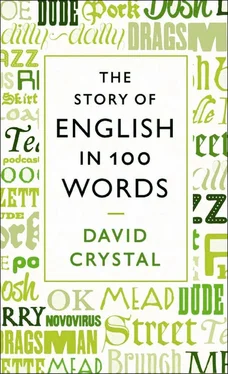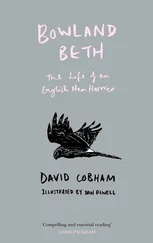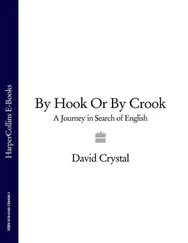Much of what we know about the early history of Britain comes from The Ecclesiastical History of the English Nation , written in Latin around 730 by the Northumbrian monk Bede. He tells us how, in the 5th century, ‘three of the most powerful nations of Germany — Saxons, Angles and Jutes’, arrived in the British Isles. It isn’t possible to say exactly where they came from, or even whether they were as nationally distinct from each other as Bede suggests. But one thing is clear: two of those nations gave us the name Anglo-Saxon .
It’s first found in 8th-century Latin writers, who used the phrase Angli Saxones to mean the ‘English Saxons’ (of Britain) as opposed to the ‘Old Saxons’ (of the continent). The Angli part was the important bit, in their mind. It was the crucial, contrastive element — the English Saxons, as opposed to other kinds. Only later did the phrase come to mean the combined Germanic people of Britain.
In the 9th century, the name broadened its meaning. In the Treaty of Wedmore, made between King Alfred and the Danish leader Guthrum around the year 880, we see English opposed to Danish , and it plainly refers to all of the non-Danish population, not just the Angles. Also, at around the same time, English is used for the language. When Bede’s book was translated into Old English, we find several passages which take a Latin name, and then say ‘…this place is called in English…’, giving the English equivalent.
English came first; England came later. It took over a century before we find the phrase Engla lande referring to the whole country. There was then a long period of varied usage, and we find such forms as Engle land , Englene londe , Engle lond , Engelond and Ingland . The spelling England emerged in the 14th century, and soon after became established as the norm.

4. This scribe at work is probably Bede. The picture is in a 12th-century book from the north-east of England, The Life and Miracles of St Cuthburt .
Some strange things happened to English as the centuries passed. As the language spread to other countries, such as the USA, Australia and South Africa, people started talking about American English, Australian English and so on. This meant that, whenever anyone wanted to talk about the language as it was used in England (as opposed to Britain), they had to use the curious repeated form: English English . And since the early 20th century the word has had a plural, Englishes , referring to the kind of English used in a particular region of the world. People talk of the new Englishes developing in such countries as Singapore and Nigeria — dialects of English, but on a grand scale.
Anything associated with England attracted the adjective. In the 15th and 16th centuries, an often fatal sweating sickness (probably a type of influenza) was called the English sweat . In the 18th century, foreigners would describe people who were feeling especially low or depressed as having the English malady or melancholy . At roughly the same time, we see the emergence of the English breakfast — a substantial meal consisting of hot cooked food, such as bacon, eggs, sausages and suchlike. It was the contrast with the rest of Europe which was being noted: they just had continental breakfasts . And a similar contrast appeared during the 19th century: an English Sunday, with everything closed, was contrasted with a continental Sunday . In the USA, an interesting use developed in billiards and pool when a player hits a ball on one side so that it spins, affecting the way it bounces off another ball. It must have been an originally British technique, because the idiom is put English on the ball .
People never seemed quite sure how to handle the word English . In the 17th century, translating something into the language was said to Englify or Anglify it. In the early 18th century it was Anglicised — a usage that evidently didn’t please everyone, for later in the century we find both Englishified and Englishised . Today it seems to have settled down as Anglicise , but there’s still some variation in usage.
Anglo- and its derivatives have come to dominate, but there’s still some room in the language for Saxon . Celtic speakers sometimes refer to English people as Saxons and their language as Saxon , and the word is hidden within the Scots Gaelic (usually) jocular term Sassenach . Words in English that are of Germanic origin (as opposed to those from Latin and the Romance languages) are often called Saxon words. So there’s some life in the old word yet.
 14. Bridegroom — a popular etymology (11th century)
14. Bridegroom — a popular etymology (11th century)
What has a man about to be married got to do with someone who looks after horses? People have come up with some crazy explanations. Perhaps, in a male-dominated society, the man was thought to be ‘grooming’ his bride, or giving her the value of a horse? Or perhaps, more romantically, he was going to carry her off on his horse? The truth is less exciting, but linguistically more illuminating.
The word for a man about to be married, or just married, is first found in an Anglo-Saxon version of the Gospel of St John, but it turns up in an unfamiliar form: brydguma . This is a compound of bride and guma , which was a somewhat poetic Old English word for ‘man’. Half a millennium later, in William Tyndale’s translation of the same Gospel, it appears as brydegrome . Why the change?
During the Middle English period, the word guma fell out of use. Probably most people never used it at all, for the recorded instances are all very literary. It must have been an odd experience, hearing the word brideguma when someone got married. Everyone knew what bride meant, but guma was a mystery.
And so people, unconsciously, turned it into something more familiar. The change seems to have taken over a century. The latest example of brideguma — spelled bredgome — recorded in the Oxford English Dictionary is 1340; the earliest example of bridegroom — spelled brydegrome — is 1526.
Why did people replace gome with groom ? Because the sound and the meaning of the two words were very close. When groom first arrived in English, in the 13th century, it meant simply ‘man-child’, ‘boy’. It then broadened its meaning to apply to adults, and soon seems to have been restricted to a particular kind of adult male — someone who had an inferior position in a household. By the 16th century, this sense of ‘servant’ had narrowed further to mean an attendant who looks after horses, and this is the primary sense today — though the older use is still seen in the titles of some members of the British royal household, such as Groom of the Chamber .
So, at the end of the Middle English period, when guma was disappearing, groom , meaning ‘man’, would have been a natural replacement. And thus we have the modern form, which basically means nothing more than ‘bride’s man’.
The history of English has many examples of this kind of development — what is called ‘popular’ or ‘folk’ etymology. When people encounter an unfamiliar word, they often try to make sense of it by relating it to a word they already know. And if enough people make the same guess, the new formation can become part of the language. We see popular etymology operating again when we button-hole people: we’ve quite forgotten that originally what we were doing was ‘button-holding’ them. And it’s there when we jocularly call asparagus ‘sparrow-grass’.
Читать дальше


 14. Bridegroom — a popular etymology (11th century)
14. Bridegroom — a popular etymology (11th century)










